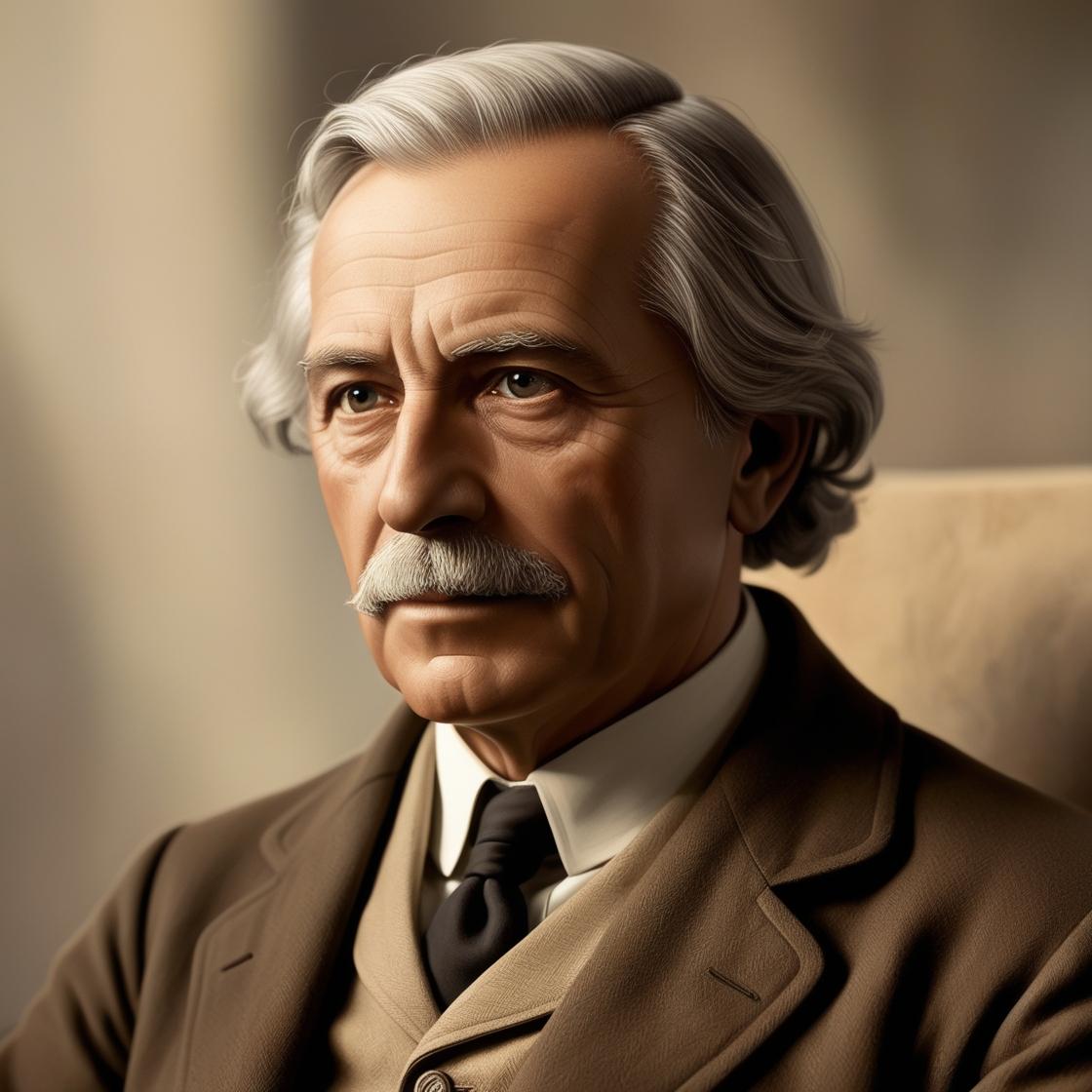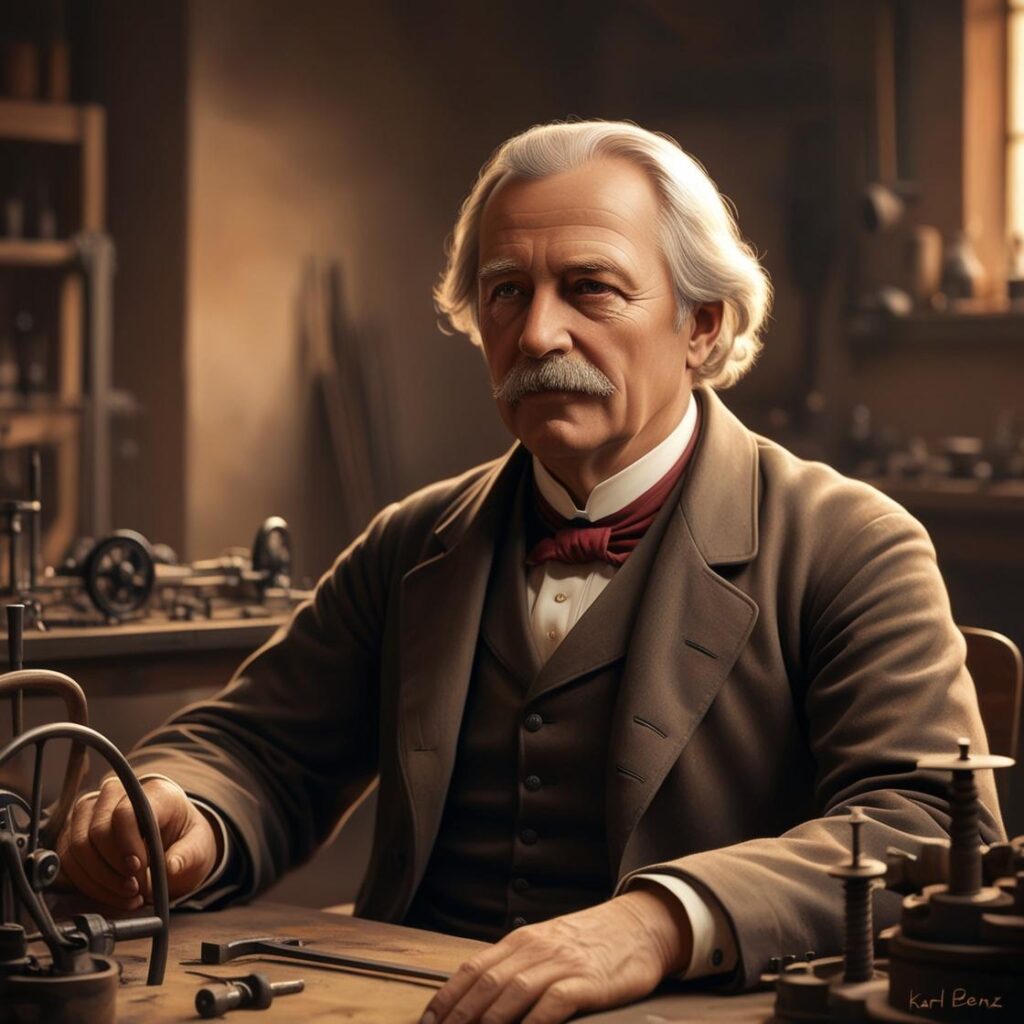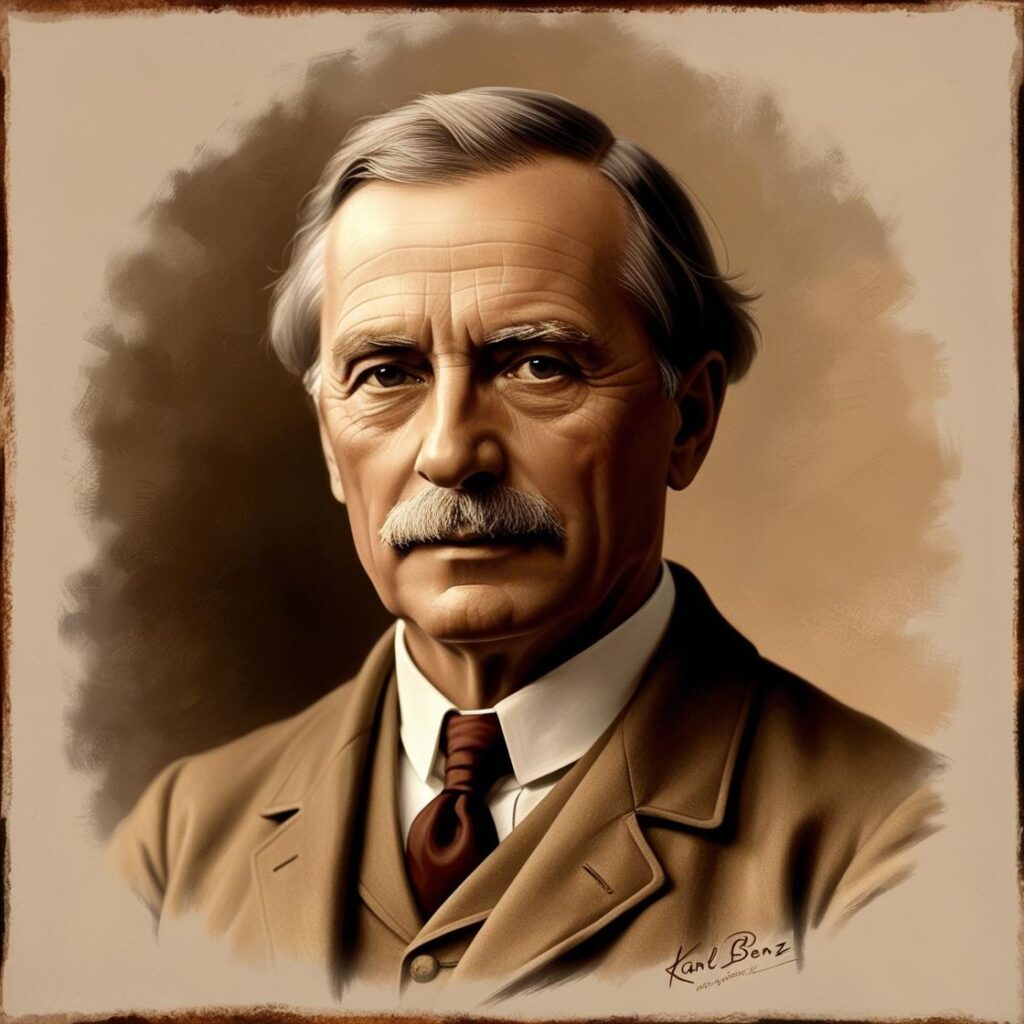
Introduction
The invention of the automobile was a pivotal moment in human history, revolutionizing transportation and altering the very fabric of society as Karl Benz first automobile engineering.
Automobiles reshaped global travel, transformed industries, and redefined the way people live and work.
At the heart of this transformation was Karl Benz, a visionary engineer whose pioneering work led to the creation of the first modern automobile.
Benz’s innovative spirit and relentless pursuit of a self-propelled vehicle marked the beginning of a new era in transportation, setting in motion advancements that would change the world in ways previously unimaginable.
The Early History of Transportation: From Horse-Drawn Carriages to Machines
Before the advent of automobiles, transportation relied heavily on horses and carriages.
These modes of travel, while essential, were inherently limited by the physical endurance of horses and the constraints of carriage design.
The need for a more efficient and faster means of travel spurred inventors and visionaries to explore mechanized solutions.
Early experiments with steam engines produced some promising results, but the bulky and inefficient nature of these prototypes significantly limited their practical application.
The quest for a viable alternative to horse-drawn carriages set the stage for Karl Benz’s groundbreaking work in the field of automobile engineering, propelling society toward a future where machines could take over the role of traditional transport.
The Life and Work of Karl Benz: A Visionary Engineer
Karl Benz was born on November 25, 1844, in Karlsruhe, Germany.
Raised in a modest environment, Benz demonstrated a keen interest in mechanics from a young age.
His fascination with how things worked propelled him to study mechanical engineering at the Karlsruhe Polytechnic.
After graduating, he embarked on a career that would eventually lead him to the world of automotive innovation Karl Benz first automobile engineering.
Benz’s early work focused on developing efficient engines, and his passion for mechanics drove him to explore the possibilities of creating a self-propelled vehicle.
His transition from mechanical engineering to automobile development marked the beginning of a journey that would not only change his life but also alter the course of transportation history forever.
Also Read: The Hidden History of Penicillin: Accidental Invention That Saved Millions
The Challenges of Creating the First Automobile
Benz faced numerous technical challenges in developing a functional automobile
Designing a reliable internal combustion engine that could power a vehicle was fraught with difficulties.
He encountered obstacles related to engine design, fuel efficiency, and material durability, each presenting unique hurdles that required innovative solutions.
Additionally, societal skepticism towards the concept of a “horseless carriage” posed significant hurdles, leading many to doubt the practicality and safety of such an invention.
Despite these obstacles, Benz’s innovative approach and unwavering perseverance enabled him to create a practical vehicle driven by an internal combustion engine, setting the foundation for modern automotive engineering and paving the way for future innovations.
Also Read: The Rise of Smartphones: How They Became an Essential Invention

The Invention of the Benz Patent-Motorwagen
In 1885, after years of relentless experimentation and refinement, Benz completed his work on the Benz Patent-Motorwagen, a revolutionary three-wheeled vehicle powered by a single-cylinder four-stroke engine.
This innovative design combined existing technologies such as internal combustion engines, wheels, and steering mechanisms into a single, cohesive system that represented a significant leap forward in automotive engineering.
The Patent-Motorwagen was not only the first gasoline-powered automobile to offer practical functionality, but it also marked a significant milestone in automotive history.
Benz’s decision to initially create a three-wheeled vehicle was later followed by the development of a four-wheeled version, further advancing the automobile’s design and capabilities.
Also Read: The Invention of the Airplane: The Wright Brothers’ Journey to Flight
First Test Drive: A Historic Moment
The first test drive of the Benz Patent-Motorwagen in 1885 was a momentous event, filled with both challenges and excitement.
The vehicle encountered technical failures during the test, and public reaction ranged from curiosity to skepticism.
Many onlookers were unsure about the viability of this new mode of transport, questioning its safety and practicality.
Despite these initial setbacks and the doubts of the public, Benz remained undeterred He dedicated himself to refining his invention, focusing on improving its reliability and performance.
His perseverance in the face of adversity underscored his commitment to transforming his vision into reality and ultimately paved the way for the automobile’s eventual acceptance and success among a skeptical public.
Also Read: The Surprising History of the Wheel: Early Uses and Development
Public Reaction: The Reception of the Automobile
The introduction of the automobile was met with mixed reactions from the public and the media as Karl Benz first automobile engineering.
While some enthusiasts hailed it as a revolutionary invention that would change the world, others were apprehensive about the implications of a horseless carriage.
Concerns regarding safety, reliability, and the potential impact on traditional transportation methods fueled skepticism among the populace.
However, as the automobile began to demonstrate its practicality and advantages over horse-drawn carriages, public perception gradually began to shift.
The cultural shift initiated by the automobile marked the beginning of a new era in transportation, one in which personal mobility became a reality for many.
The Role of Bertha Benz: A Key Contributor
Bertha Benz, Karl Benz’s wife and a formidable force in her own right, played a crucial role in demonstrating the practicality of the automobile.
In 1888, she embarked on a long-distance journey from Mannheim to Pforzheim in the Benz Patent-Motorwagen, covering over 100 kilometers.
This historic journey not only publicized the automobile but also proved its reliability and potential for everyday use.
Bertha’s pioneering drive was instrumental in gaining public acceptance for the automobile and highlighted the importance of women in the technological advancements of the time.
Her journey also helped to address some of the vehicle’s shortcomings, leading to improvements in braking and fuel delivery systems.
Early Improvements and Innovations
Following the successful demonstration of the Benz Patent-Motorwagen, Karl Benz continued to refine and improve his design.
He introduced innovations such as gears, a reliable carburetor, an ignition system, and brakes, all of which significantly enhanced the vehicle’s performance and usability.
These early improvements laid the groundwork for future advancements in automotive engineering, setting the stage for the development of more sophisticated and efficient automobiles.
Benz’s commitment to continuous improvement reflected his understanding that innovation was crucial to the automobile’s long-term success in the marketplace.
The Formation of Benz & Cie. and the Rise of the Automobile Industry
In 1883, Karl Benz founded Benz & Cie. , a company dedicated to the production of automobiles.
This pivotal move marked the beginning of the commercial automobile industry, as Benz’s cars began to attract attention and orders from the public.
The establishment of Benz & Cie. facilitated the production of early automobile models, signaling the start of a new industrial era.
As demand for automobiles grew, the company’s expansion played a pivotal role in the development of the global automotive industry, laying the foundation for future manufacturers and innovations that would follow in the decades to come.
The Competition and the Growth of the Automobile Market
The success of Benz’s automobiles spurred competition within the burgeoning industry as Karl Benz first automobile engineering.
Notable figures such as Gottlieb Daimler and Wilhelm Maybach emerged as key competitors, contributing to the rapid advancement of automobile technology.
The rivalry between Benz and Daimler eventually led to the formation of Mercedes-Benz, a brand that remains synonymous with luxury, performance, and innovation.
The expanding automobile market fueled global demand, driving the industry’s growth and establishing the automobile as a staple of modern life.
This competition encouraged continuous innovation, with manufacturers striving to develop more efficient, powerful, and accessible vehicles for the growing consumer base.
The Legacy of Karl Benz: Revolutionizing Transportation
Karl Benz’s invention of the first modern automobile had a profound and lasting impact on transportation and society as a whole.
The automobile revolutionized the way people traveled, transforming cities, infrastructure, and industries.
Benz’s work laid the foundation for the modern automotive industry, influencing the development of mass production techniques, global supply chains, and the emergence of major car manufacturers.
His innovations continue to inspire engineers and inventors around the world, pushing the boundaries of what is possible in transportation technology.
The continued evolution of the automobile industry, driven by the spirit of innovation that Benz exemplified, reflects his enduring legacy as a pioneer of modern transportation.
The Automobile’s Societal Impact: Changing the World Forever
The automobile’s influence extends far beyond transportation; it has profoundly impacted social mobility, urban planning, and global trade.
The concept of personal freedom and independence was redefined by the ability to travel long distances quickly and conveniently.
The rise of automobiles led to the development of road networks and reshaped entire industries such as tourism, logistics, and manufacturing.
The cultural and economic shifts brought about by the automobile continue to shape modern society, underscoring its significance as a transformative invention that has changed the way people interact with their environments and each other.

Modern Day Developments: From Benz’s First Car to Electric Vehicles
Karl Benz’s pioneering work paved the way for over a century of automotive evolution as Karl Benz first automobile engineering.
The transition from internal combustion engines to electric vehicles and alternative fuels highlights the industry’s commitment to sustainability and innovation in response to contemporary challenges.
Modern developments such as autonomous vehicles, connected car technologies, and environmentally friendly designs reflect the ongoing influence of Benz’s original invention.
As the automobile industry continues to evolve, incorporating advanced technologies that promise to enhance safety and efficiency, Benz’s legacy remains a testament to the power of innovation and its potential to change the world for the better.
Karl Benz’s Lasting Legacy: A Vision Realized
Karl Benz’s critical role in inventing the first modern automobile sparked a technological revolution that transformed the world.
His innovations laid the groundwork for the automobile industry, influencing countless aspects of modern life.
Benz’s vision of a self-propelled vehicle not only revolutionized transportation but also inspired generations of engineers, inventors, and entrepreneurs to pursue their dreams of innovation.
His legacy is not merely the invention of a machine; it is a lasting reminder of the impact that one visionary can have on the course of history.
Conclusion
In closing, the birth of the automobile, catalyzed by Karl Benz’s ingenuity and determination, marks a significant turning point in human history.
The automobile has not only changed the way we travel but has also reshaped our urban landscapes, economies, and lifestyles in profound ways.
As we continue to innovate and adapt to new challenges, such as environmental sustainability and technological advancements, the legacy of Benz serves as a reminder of the transformative power of human creativity and perseverance.
The journey from the Benz Patent-Motorwagen to the modern automobile encapsulates an ongoing narrative of progress, one that will undoubtedly continue to evolve as we strive for a better, more connected world.
Benz’s vision and determination have left an indelible mark on society, ensuring that the automobile will remain a vital part of our lives for generations to come, continuing to inspire future innovations that will shape the next chapter in the history of transportation.